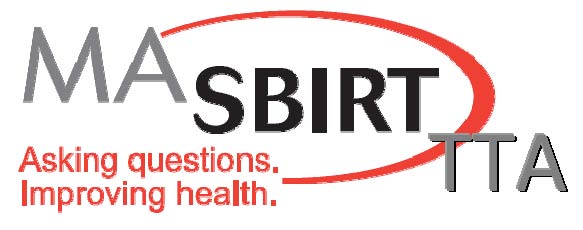MASBIRT Training & Technical Assistance
Visit www.MASBIRT.org for more information.
 What is MASBIRT TTA?
What is MASBIRT TTA?
MASBIRT TTA is the MAssachusetts Screening, Brief Intervention, and Referral to Treatment – Training & Technical Assistance program. MASBIRT TTA is funded by the MA Department of Public Health, Bureau of Substance Abuse Services (BSAS).
MASBIRT TTA supports BSAS’ ongoing efforts to establish SBIRT practice as a standard of care in diverse healthcare settings throughout Massachusetts by providing implementation and sustainability guidance, along with skills training and coaching for all levels of clinical and administrative personnel. MASBIRT TTA uses diverse teaching methods and ongoing technical assistance, troubleshooting, and coaching. The MASBIRT TTA team also utilizes SBIRT expert consults to assist with training and technical assistance, as needed.
The MASBIRT TTA team has provided local, regional and national SBIRT training and education as part of the Substance Abuse and Mental Health Services Administration (SAMHSA) funded state SBIRT cooperative agreement from 2006-2012. The MASBIRT TTA team also directed the successful implementation of universal SBIRT services in diverse clinical settings (i.e., inpatient, outpatient, emergency/urgent care, specialty healthcare settings) for over 170,000 patients.
What is SBIRT?
Screening, Brief Intervention and Referral to Treatment (SBIRT) is a comprehensive, integrated, public health approach to identify patients whose patterns of alcohol and/or drug use put their health at risk and intervene early.
SBIRT components are:
- Universal annual Screening identifies unhealthy use. 75-85% of patients will screen negative. For those who screen positive, further assessment is needed to determine level of risk.
- Brief Intervention provides feedback about unhealthy substance use. It also focuses on education, increasing patient insight and awareness about risks related to unhealthy substance use and enhances motivation toward healthy behavioral change.
- Referral to Treatment helps facilitate access to specialty assessment and addiction treatment for those who need specialized care. A referral is usually indicated for only about 5% of people screened.
Why is SBIRT important?
Unhealthy alcohol and other drug use are among the most common causes of preventable morbidity and mortality (Mokdad, JAMA 2004). Despite their frequent presentation in healthcare settings, unhealthy alcohol and other drug use often go unrecognized. While there is substantial research on the effectiveness of SBIRT on alcohol use, there is less research on the impact of SBIRT on other drug use. Unhealthy substance use can complicate existing chronic conditions like diabetes, hypertension, cardiovascular diseases or mental health disorders and interact with prescribed medications.Research has shown that large numbers of people whose patterns of use put them at-risk of developing alcohol or drug problems can be identified through screening (Babor, Substance Abuse 2007).
SBIRT has been found to:
- decrease the frequency and severity of drug and alcohol use (Madras, Drug Alcohol Depend 2009; Kaner, Drug Alcohol Rev 2009; Humeniuk, Addiction 2012)
- decrease emergency department visits and hospital days (Fleming, Alcohol Clin Exp Res 2002)
- demonstrate net-cost savings (Fleming, Alcohol Clin Exp Res 2002; Estee, Med Care 2010; Solberg, Am J Prev Med 2008)
The U.S. Preventive Services Task Force (USPSTF) recommends screening and behavioral counseling interventions to reduce alcohol misuse by adults, including pregnant women, in primary care settings. The National Quality Forum (NQF) endorses outpatient annual alcohol screening and recommends a systematic approach be used to identify drug use. The Joint Commission currently has optional quality standards that require unhealthy substance use identification and management in inpatient settings.
How will practices have time for SBIRT?
With once per year screening, most patients (between 75-85%) will be negative. Screening consists of 3-4 simple questions, requiring 2-3 minutes of staff time. A full screening (e.g., assessment for consequences and severity of use) and brief intervention (i.e., brief, motivational counseling) for positive patients (15-25%) takes between 5-20 minutes. Some practices have found a team approach in which different staff are responsible for the different SBIRT components minimizes the time burden. Other practices have integrated SBIRT services into current screening protocols and are conducted by a single staff member.
More MASBIRT TTA Information:
Menu of Services
Training Resources
SBIRT Resources
Contact Information:
MASBIRT TTA Phone: (617) 414-3749
MASBIRT TTA E-mail: MASBIRT@bmc.org
MASBIRT TTA Website: www.MASBIRT.org
Alissa Cruz, MPH, Program Director: Alissa.Cruz@bmc.org
Lee Ellenberg, LICSW, Training Manager: Lee.Ellenberg@bmc.org